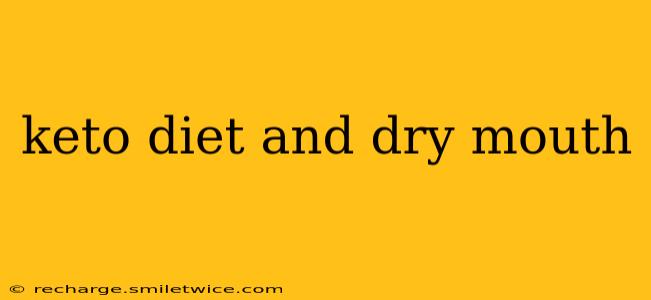The ketogenic diet, a high-fat, low-carbohydrate eating plan, has gained popularity for its potential weight-loss benefits. However, one common side effect reported by many individuals following a keto diet is dry mouth. This article explores the reasons behind this connection, offering solutions to alleviate this uncomfortable symptom.
Why Does the Keto Diet Cause Dry Mouth?
The primary reason for dry mouth on the keto diet is often linked to dehydration. When your body switches to ketosis – burning fat for fuel instead of carbohydrates – it produces ketones. This metabolic shift can lead to increased urination, which, if not compensated for by sufficient water intake, results in dehydration. Dehydration is a leading cause of dry mouth (xerostomia).
Furthermore, the keto diet often restricts carbohydrate consumption, impacting saliva production. Carbohydrates break down into simple sugars, which are used by the salivary glands to create saliva. Reducing carbohydrate intake can, therefore, indirectly affect saliva production, leading to dryness in the mouth.
Finally, some individuals on keto experience electrolyte imbalances, particularly a deficiency in sodium, potassium, and magnesium. These electrolytes play crucial roles in fluid balance within the body, and their depletion can exacerbate dehydration and contribute to dry mouth.
How to Alleviate Dry Mouth on the Keto Diet?
Managing dry mouth while following a ketogenic diet requires a multi-pronged approach:
1. Increase Water Intake: This is paramount. Aim for at least 8 glasses of water daily, and more if you're exercising or sweating. Carry a water bottle with you and sip consistently throughout the day.
2. Electrolyte Balance: Pay close attention to your electrolyte intake. Consider supplementing with electrolytes, particularly sodium, potassium, and magnesium, as advised by your doctor. Foods rich in these electrolytes, such as bone broth, avocados, and leafy greens, can also help.
3. Sugar-Free Gum or Mints: Chewing sugar-free gum or sucking on sugar-free mints can stimulate saliva production, providing temporary relief. Ensure they are truly sugar-free as sugar can hinder ketosis.
4. Humidifier: Using a humidifier, especially in dry climates or during winter, can add moisture to the air, helping to alleviate dry mouth.
5. Avoid Mouthwashes Containing Alcohol: Alcohol-based mouthwashes can further dry out the mouth. Opt for alcohol-free alternatives.
Can Certain Keto Foods Exacerbate Dry Mouth?
While dehydration and electrolyte imbalance are major contributors, some keto-friendly foods might indirectly worsen dry mouth. Highly processed keto snacks or those containing excessive salt might cause increased thirst, which could lead to more frequent urination, thus increasing dehydration if water intake isn't adjusted accordingly.
When to See a Doctor about Dry Mouth on Keto?
While mild dry mouth is a common side effect, persistent or severe dry mouth could indicate an underlying health problem. Consult your doctor if you experience:
- Persistent dry mouth despite increased water intake and electrolyte management.
- Dry mouth accompanied by other symptoms, such as extreme thirst, fatigue, or changes in urination.
- Difficulty swallowing or speaking due to dry mouth.
Persistent dry mouth can negatively impact oral health, increasing the risk of cavities and gum disease. Addressing the issue promptly is vital for both your overall health and oral hygiene.
Is Dry Mouth a Sign That the Keto Diet Isn't Right for Me?
Dry mouth itself isn't necessarily a sign that the keto diet is unsuitable. It's a manageable side effect. However, if the dry mouth is severe and negatively impacting your quality of life despite your efforts to address it, you should consult your doctor to discuss potential alternatives. They can help determine if the keto diet is the right choice for you, considering your individual health circumstances.
This information is for general knowledge and informational purposes only, and does not constitute medical advice. It is essential to consult with a healthcare professional before starting any diet, especially if you have pre-existing health conditions. They can help you create a personalized keto plan and address any concerns you may have regarding potential side effects.
